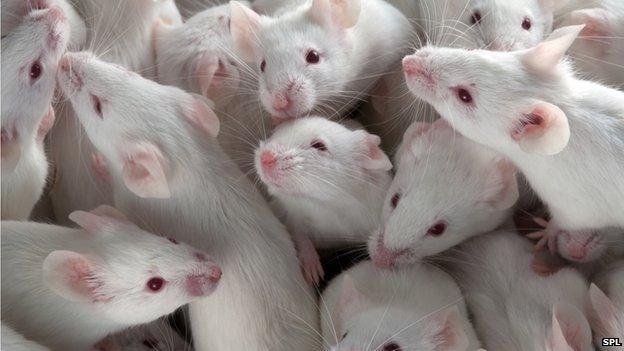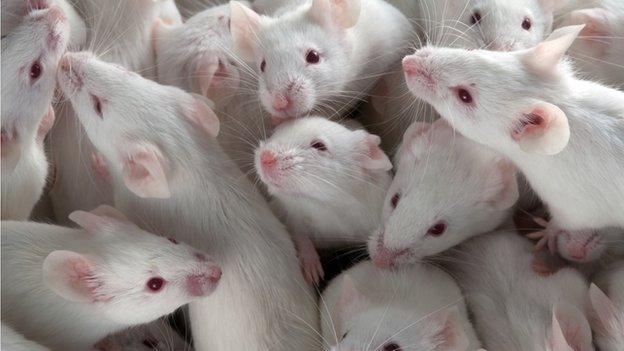Animal research 'pledge on openness' agreed
- Published
.jpg)
UK animal researchers have signed a pledge to be transparent about the nature of their experiments.
The Concordat on Openness on Animal Research has initially been signed by 72 organisations, including universities, bio-industry companies, charities and research councils.
The scientific community has long recognised the need to engage with the public about animal research.
But many held back for fear of being targeted by animal rights extremists.
Transparency is also limited by legal restrictions that prevent the Home Office from disclosing information about animal experiments.
To overcome these barriers, in 2012 more than 40 bioscience organisations declared they would commit to a Concordat on Openness.
Since then they have been seeking the opinions of the public, the scientific community and journalists as to what steps need to be taken.
Public visits
Today the 72 signatories of the Concordat have undertaken to fulfil four commitments:
We will be clear about when, how and why we use animals in research.
We will enhance our communications with the media and the public about our research using animals.
We will be proactive in providing opportunities for the public to find out about research using animals.
We will report on progress annually and share our experiences.
Communication about animal research "should provide accurate descriptions of the benefits, harms and limitations of research, be realistic about the potential outputs of such research and be open about its impact on animal welfare and the ethical considerations involved", said the authors.
The document "strongly encourages" signatories to offer access to their animal research facilities to journalists, MPs, and local school, patient and community groups.

Wendy Jarrett, chief executive of Understanding Animal Research and chair of the Concordat's Working Group, said: "For many years, the only 'information' or images that the public could access about animal research were provided by organisations opposed to the use of animals in scientific progress.
"This is why many people still think that animal research means testing cosmetics and tobacco, despite the fact that these have been banned in the UK for more than 15 years.
"The Concordat is an excellent opportunity to dispel these myths and give the public a chance to see the ground-breaking research that is being done on its behalf."
'Unpalatable truth'
Steve Bates, chief executive officer, BioIndustry Association, said: "Animal research is an underpinning and essential part of developing life-saving and life-changing therapies and this is why we are happy to be part of a coalition which explains its importance to the British public.
"Public support for animal research remains strong and we hope that these additional commitments will help to maintain this."
The British Union for the Abolition of Vivisection (BUAV) said the Concordat was a "step towards genuine openness".
"However, this is simply transparency on their terms. The Concordat is choosing to give what they want to give," said Michelle Thew, BUAV chief executive.
"If genuine openness is what the Concordat wants, then we call on the signatories to back the removal of Section 24... which currently prevents the Government itself from disclosing most information on animal experiments."
Wendy Higgins, communications director of the Humane Society International, said: "This Concordat presents a veneer of openness but it's actually just another platform for obscuring the unpalatable truth about animal experiments.
"There is no meaningful commitment here to measures that could make a real contribution to ensuring openness and appropriate scrutiny, such as allowing genuinely open access to laboratories or improving reporting of animal based projects in scientific literature, including where they produce results of little relevance to people.
"It is insulting to the intelligence of both journalists and the public to claim transparency whilst at the same time saying that 'practical reasons' may prevent access to animal laboratories.
"Hand selecting journalists to come on pre-arranged and carefully PR-managed tours of animal labs where more often than not the only animals on display are healthy looking rodents, is not an honest look inside the often highly distressing world of animal experiments."
- Published28 January 2014
- Published7 February 2014

- Published14 March 2012